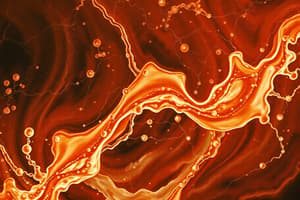Podcast
Questions and Answers
What is the primary role of iron ions in the body?
What is the primary role of iron ions in the body?
- Regulation of thyroid hormones
- Transport of oxygen and carbon dioxide (correct)
- Formation of bone structure
- Storage of vitamins
Which food is considered a good source of iron?
Which food is considered a good source of iron?
- Shellfish
- Spinach (correct)
- Chicken
- Chocolate
What condition is caused by excessive iron accumulation in the body?
What condition is caused by excessive iron accumulation in the body?
- Iron-deficiency Anemia
- Hypothyroidism
- Wilson disease
- Hemosiderosis (correct)
Copper ions are essential for the synthesis of which of the following?
Copper ions are essential for the synthesis of which of the following?
What condition is associated with abnormal copper metabolism?
What condition is associated with abnormal copper metabolism?
What effect does a deficiency in iodine have on the body?
What effect does a deficiency in iodine have on the body?
Which of the following foods provides a significant amount of iodine?
Which of the following foods provides a significant amount of iodine?
What is a key function of the thyroid gland?
What is a key function of the thyroid gland?
Flashcards
Iron Ions
Iron Ions
Positively charged ions found in the body, primarily in haemoglobin within red blood cells. Crucial for oxygen and carbon dioxide transport.
Iron-Deficiency Anemia
Iron-Deficiency Anemia
A condition caused by an iron-deficient diet, characterized by insufficient red blood cell production due to lack of iron.
Hemosiderosis
Hemosiderosis
Excess iron accumulation in the body. Can lead to organ damage if untreated.
Hemochromatosis
Hemochromatosis
Signup and view all the flashcards
Copper Ions
Copper Ions
Signup and view all the flashcards
Wilson Disease
Wilson Disease
Signup and view all the flashcards
Iodine
Iodine
Signup and view all the flashcards
Hypothyroidism
Hypothyroidism
Signup and view all the flashcards
Study Notes
Iron Ions
- Positively charged ions found in the body
- About 70% in red blood cells, as hemoglobin
- Sources: legumes, red meat, liver, spinach, pumpkin seeds, fish
- Essential for oxygen and carbon dioxide transport (hemoglobin and myoglobin)
- Crucial component of electron transport chain enzymes (cytochromes)
- Component of peroxidase enzyme (lysosomal function in white blood cells)
- Involved in breaking down bacteria and other phagocytosed materials
- Related clinical conditions:
- Iron-deficiency Anemia (diet-related)
- Hemosiderosis (excess iron)
- Hemochromatosis (abnormal iron deposits in organs)
Copper Ions
- Positively charged inorganic ions in the body
- Sources: shellfish, seeds/nuts, organ meats, wheat, whole grains, chocolate
- Essential component of various proteins and enzymes
- Needed for hemoglobin, collagen, and elastin synthesis
- Required for normal nervous system development
- Related clinical condition:
- Wilson's disease (abnormal copper metabolism)
- Characterized by abnormal copper deposition in liver and brain (leading to cirrhosis and brain damage)
- Copper deposition in kidneys can cause renal failure
- Wilson's disease (abnormal copper metabolism)
Iodine Ions
- Mineral found in earth's soil and ocean waters
- Abundant in iodized salt, saltwater fish, and plant-based foods
- Crucial for thyroid gland health (located at the base of the neck)
- Thyroid gland regulates hormone production (influencing metabolism, heart health, etc.)
- Takes up iodine to create thyroid hormones
- Insufficient iodine can lead to decreased thyroid hormone production and hypothyroidism (underactive thyroid)
- Sources include dairy products, fortified foods, saltwater fish, plants from iodine-rich soil, and iodized salt
- Iodine requirement: 150 µg/day (micrograms, not kilograms)
- Related condition:
- Goiter (enlarged thyroid): can result from either hypothyroidism or hyperthyroidism
- Hyperthyroidism (overactive thyroid)
Studying That Suits You
Use AI to generate personalized quizzes and flashcards to suit your learning preferences.



